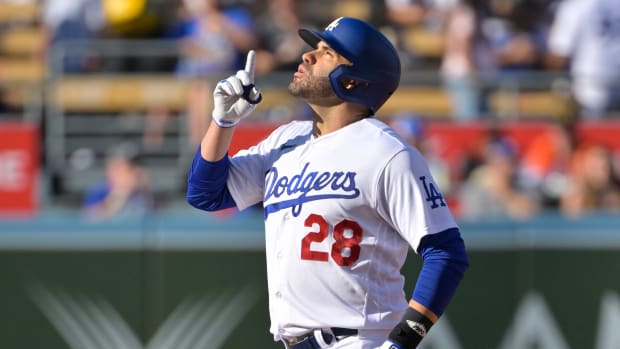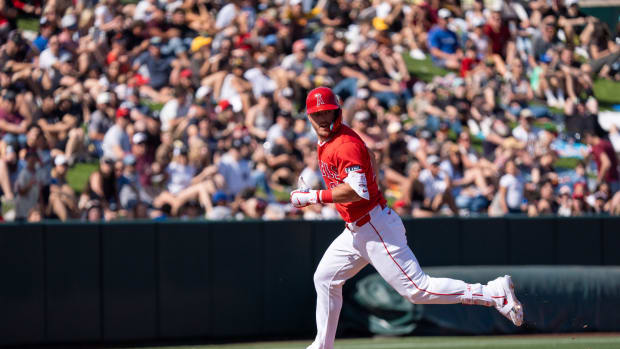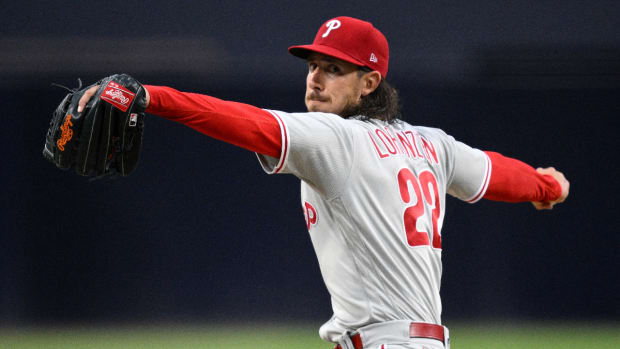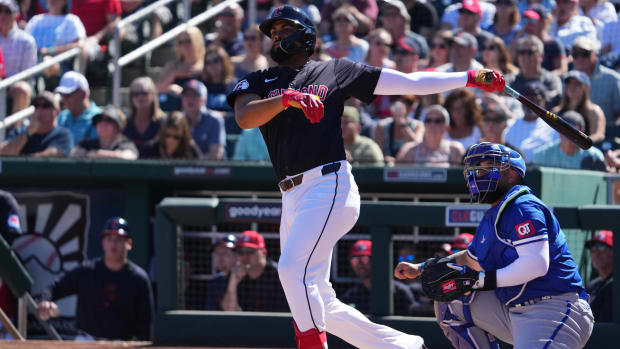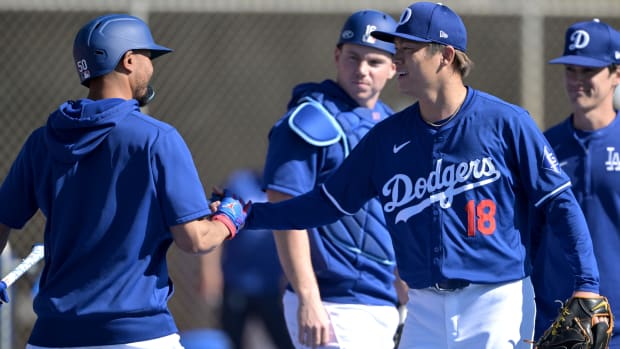Three Strikes: Young sluggers help set record, give hint of what's to come
If someone wants to give you the tired, misinformed “baseball is dying” argument, tell them to look what happened on Monday, just one day of playoff baseball. It wasn’t only that National League playoff baseball returned to the previously dormant major markets of Chicago and New York, in front of delirious crowds with more than a bit of revenge on their minds. It wasn’t just that upstart Houston, holding a four-run lead six outs away from advancing to the ALCS, allowed Kansas City to score seven unanswered runs, providing more proof that no sport has a endgame better than baseball because the possibility of a comeback is never bound by time. No taking a knee. No running out the clock.
The joy also came from four action-packed games in which we were reminded that youth is helping bring back offense to a game bent on mastering run prevention. All four winning teams Monday scored at least eight runs. How rare is that? There have been seven different years of LDS play in which fewer teams won with at least eight runs.
NLDS Game 4 previews: Cubs, Mets try to finish Dodgers', Cardinals' seasons
Now consider this: There were a one-day record 21 home runs hit Monday—17 of them by players in their 20s. (The exceptions were Chris Colabello, 31, of Toronto and Adrian Gonzalez, 33, and Howie Kendrick, 32, of the Dodgers.) Impressive rookies like the Cardinals' Stephen Piscotty, 24, the Cubs' Kyle Schwarber, 22, and Kris Bryant, 23, and the Astros' Carlos Correa, 21, all went deep.
Other 20-something stars to go yard Monday included the Royals' Salvador Perez, 25, and Eric Hosmer, 25, St. Louis's Jason Heyward, 26, Chicago's Anthony Rizzo, 26, the Mets' Yoenis Cespedes, 29, and the Blue Jays' Josh Donaldson, 29.
One day doesn’t make a trend. While runs and home runs did tick up this year, the game only is back to 2012 levels when it comes to offense. But for one symbolic day, anyway, young hitters may have provided a hint of what’s to come.
2. 42 for (Game) 5
Forty-two pitches. If you never saw the Royals play, all you needed to see to understand them were 42 pitches in the eighth inning Monday in Houston. In a span of 42 pitches, the Royals went from pending elimination to an ALDS Game 5—from four runs down with six outs left to one run up. And here’s all you need to know about why Kansas City is still alive, in case you didn’t learn your lesson from last October: Among those 42 series-altering pitches, Houston coaxed just three swings and misses out of the Royals, including only one on 19 tries at getting a third strike.
It was death by a thousand paper cuts: single, single, single, single, single, error, stolen base, strikeout (which took 10 pitches to get), walk and—to score the go-ahead run—ground-ball out.
Resilient Royals summon late magic to beat Astros, force Game 5
It was the triumph of making contact, of cutting down a swing and trusting the guy behind you to keep the rally going. The Royals may have finished eighth in the AL in slugging during the regular season, but they are one of the league’s best rally teams. Among all major league teams, the Royals were last in strikeouts by their hitters and were the second-best team in batting average with two strikes (Boston ranked first) and at hitting with runners on (Toronto was first). Such grinding tactics play especially well in October.
Now Houston has to walk into Kansas City and play a win-or-go-home game for both teams. That same scenario turned out fairly well for San Francisco last year, though with the way Houston's bullpen is melting down, the Astros may need ace Dallas Keuchel to play the role of Madison Bumgarner on two days of rest.
You would think the home team would have a decided edge in such winner-take-all games. But in the wild-card era (since 1995), the home team is 21–24 in sudden death games. When it comes to playoff baseball, maybe foul balls, ground balls and general nuisance at bat hold more of an edge than the home field.
• MORE MLB: Full postseason schedule, start times, TV listings
3. Interpreting Gibbons's odd pitching moves
Monday's strangest move came when Jays manager John Gibbons pulled starting pitcher R.A. Dickey despite him throwing well and being one out away from qualifying for a win. Just how strange was it? Only one other manager in postseason history had ever hooked his starter one out from getting a win in an outing in which he allowed one or no runs and no walks: Tony La Russa, who yanked Jaime Garcia from 2011 NLCS Game 5 against Milwaukee.
But here’s one difference: La Russa was holding a 4–1 lead when he gave Garcia the hook. Gibbons held a 7–1 lead over Texas when he pulled Dickey with one on and Shin-soo Choo, who had gone 2-for-2 to that point, coming up to bat.
Banister’s choice to start lefty Holland backfires in Rangers’ Game 4 loss
“One thing I’ve learned over the years, sometimes the best way you win games is don’t let the team get back into it,” said Gibbons, who brought in David Price to face Choo. “Especially this … you know, it’s our first go-round with this kind of game, but I know what kind of offense they have. So I was really focusing on Choo. He hit him twice, and he’s hit him in his career. What we didn’t want to happen is a couple guys on base, Choo comes up. And R.A. has been known to give up the fly balls, launch it. Maybe if that should happen now, they’re right back in the game.”
The decision seems even more curious knowing this: Gibbons then had Price, his ace, throw 50 pitches of low-leverage middle relief, a workload that Gibbons said will preclude Price from pitching out of the bullpen in Game 5. (It’s an assumption Price disputed.)
It was difficult to fathom, especially because Dickey is a 40-year-old former Cy Young Award winner, not some wide-eyed kid. But here’s what you can interpret from Gibbons’ decision:
• He is a very aggressive postseason manager.
• He doesn’t consider any spot a low-leverage spot when his team is playing an elimination game.
• He has tremendous faith in covering Game 5 without Price, which begins with Marcus Stroman, whom the Jays actually like more than Price against Texas, and might involve Dickey as a reliever.
Watching Gibbons, a modern-day Sparky Anderson, run a sudden-death playoff game on Wednesday ought to be a lot of fun.
































